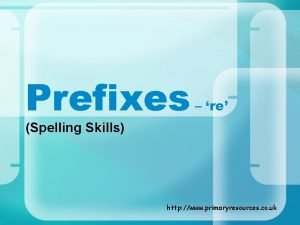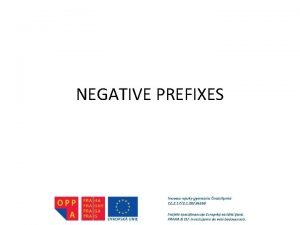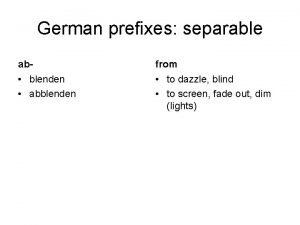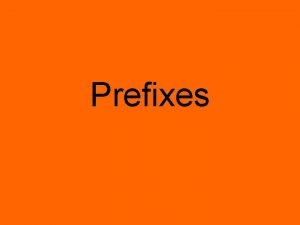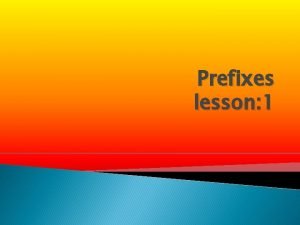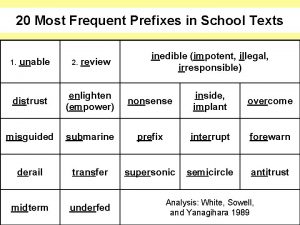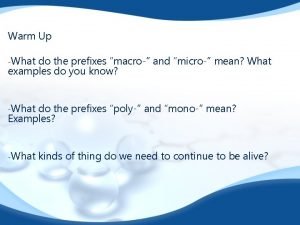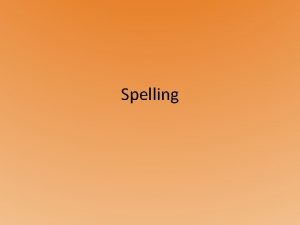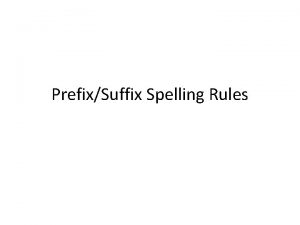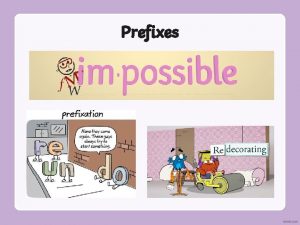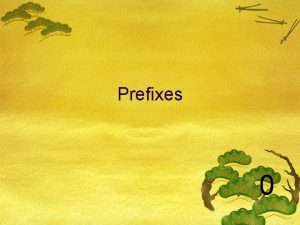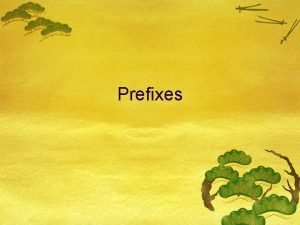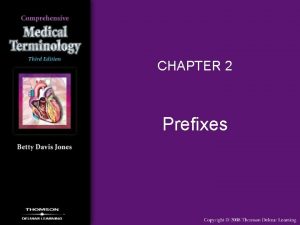Spelling Prefixes A prefix is an addition to









- Slides: 9

Spelling

Prefixes • A prefix is an addition to the beginning of a word to form a related word. When adding a prefix, do not change the spelling of the prefix or the base word. • Dis + appear = disappear • Mid + night = midnight • When using ex- to mean former, always add a hyphen: ex-president. • When a word begins with the same consonant that a prefix ends with, keep both consonants: satisfied--dissatisfied

Suffixes • A suffix is an addition to the end of a word to form a related word. • When a word ends with the same consonant that the suffix begins with, keep both consonants: mean—meanness • When adding a suffix that begins with a vowel to a one-syllable word that ends with a vowel and consonant, double the consonant before adding the suffix: sit—sitting

Suffixes • When a two-syllable word ends with a vowel and a consonant and the word is accented on the last syllable, double the consonant before adding a suffix: begin—beginner • Note: If the accent is shifted back from the last syllable when the suffix is added, the consonant is NOT doubled: refer—reference

Words ending in y • When a word ends in a consonant and a y, change the y to i when adding a suffix: busy— business, cry—cried • Exception to the consonant and y rule: cry— crying, copy—copyist • When a word end in a vowel and y, keep the y when adding a suffix: pay—payable, enjoy— enjoyment

The ei, ie rule • I before e, Except after c, Or when sounded like a, As in neighbor and sleigh • I before e: belief, piece, siege, shriek • E before I following c: deceit, receive • E before I when sounded like a: weight, vein • Some exceptions: leisure, neither, weird, seize

Plural nouns • Most nouns add an s to form the plural: face— faces • When a word ends in ful, the s to form the plural is add to the end of the word: handful— handfuls • The plurals of proper nouns preceded by a title are formed by pluralizing either the title or the noun: Dr. Hopkinses or Doctors Hopkins

Possessives • Possessive forms for most singular nouns are formed by adding an ‘s: telephone—telephone’s • Plural nouns not ending in s, add an ‘s: children— children’s • Plural nouns ending in s, add only the apostrophe: sisters—sisters’ • An ‘s added to the last noun of a compound subject will form the possessive: Jim and Kevin’s mother • An ‘s will show separate ownership: Jim’s and Kevin’s report cards • The possessive form of a compound word is made with ‘s only after the last noun: brother-in-law’s car

Contractions • A contraction is a shortened form of a word or word group by replacement of a letter or sound with an apostrophe. • An apostrophe can be used to replace a lost vowel: do + not = don’t • An apostrophe can be used to replace the ha sound in have: we + have = we’ve • Irregular contractions: will not—wont, cannot —can’t
